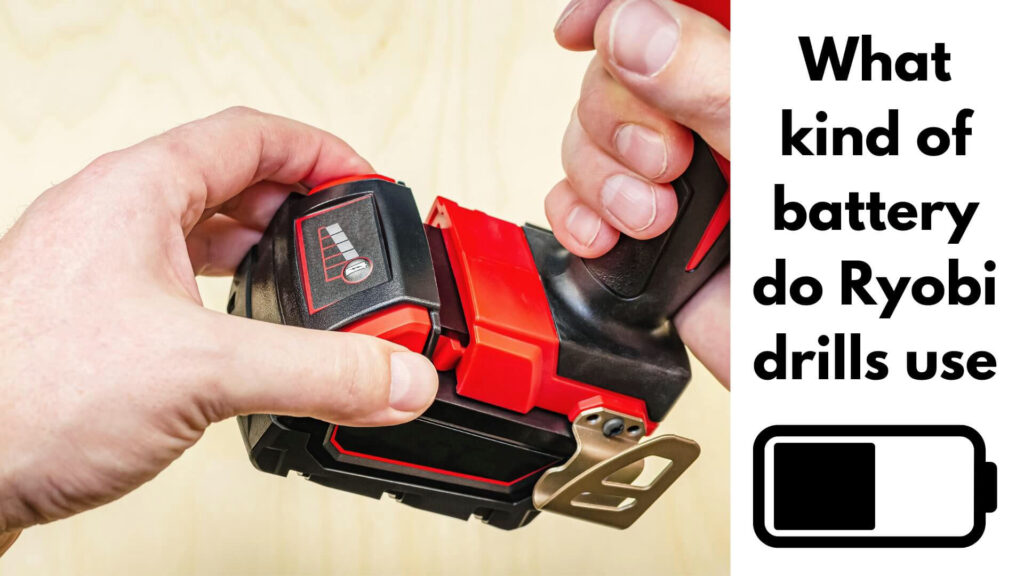Ryobi is known for its wide range of power tools, and its drills are some of the most popular on the market. A major factor behind their popularity is the interchangeable battery system, which makes their tools versatile and cost-effective. In this blog, we’ll dive into the types of batteries Ryobi drills use, how to care for them, and frequently asked questions about their lifespan and maintenance.
Table of Contents
What type of battery does a Ryobi drill use?
Ryobi drills typically use 18V lithium-ion (Li-ion) batteries, which are part of Ryobi’s One+ battery system. This system allows one battery to be used across a variety of Ryobi power tools, providing flexibility and convenience. Ryobi also offers NiMH (Nickel-Metal Hydride) and NiCd (Nickel-Cadmium) batteries for older models, though most modern Ryobi drills now rely on Li-ion technology due to its superior performance and longevity.
Key Battery Types for Ryobi Drills:
Nickel-Cadmium (NiCd) Batteries: While durable, NiCd batteries have largely been replaced by Li-ion in modern drills due to environmental concerns and lower performance.
Lithium-ion (Li-ion) Batteries: These are the most common in current models due to their lightweight, long-lasting charge, and quick recharge times.
Nickel-Metal Hydride (NiMH) Batteries: These are used in some older Ryobi models and offer good power but don’t match Li-ion’s efficiency.
How do I care for my battery?
Caring for your Ryobi drill battery is essential for maximizing its lifespan and performance. Here are a few tips:
Use only Ryobi-approved chargers to maintain the battery’s integrity and avoid damage.
Charge the battery fully before using it for the first time.
Store batteries in a cool, dry place to prevent overheating.
Avoid fully discharging the battery often, as this can decrease its lifespan.
Clean the battery contacts regularly to ensure proper charging and avoid buildup of dust and grime.
How long will a battery last?
The lifespan of a Ryobi drill battery depends on the type of battery and how often you use it. On average:
- Li-ion batteries can last between 3 to 5 years or approximately 300-500 charge cycles.
- NiMH batteries tend to last 2 to 3 years, depending on usage.
- NiCd batteries, although older technology, have a lifespan of about 1 to 2 years.
Proper care, including avoiding overcharging and storing the battery in optimal conditions, will help prolong its life.
How do I charge my battery?
Charging your Ryobi drill battery is straightforward. Ryobi provides dedicated chargers that are compatible with the One+ battery system. Follow these steps:
Once the green light appears, the battery is fully charged and ready to use.
Insert the battery into the charger ensuring that it is securely placed.
Plug the charger into a power outlet.
The charger will have indicator lights (usually red and green) to show the charging status.
What is Li-ion technology?
Lithium-ion (Li-ion) technology has become the standard for modern power tools due to its high energy density and lightweight design. These batteries:
- Provide longer run time than older technologies like NiMH or NiCd.
- Are lighter, making the drill easier to handle.
- Have no memory effect, meaning they don’t need to be fully discharged before recharging.
- Charge faster, allowing you to get back to work quickly.
Li-ion batteries are environmentally friendly compared to older options, though they still require careful disposal due to their chemical makeup.
What is NiMH technology?
Nickel-Metal Hydride (NiMH) batteries were once the go-to for cordless drills but have been overtaken by Li-ion technology. NiMH batteries are still viable for certain applications and offer:
- Higher capacity than NiCd batteries.
- Less memory effect, though they are still susceptible to partial charge issues.
- Environmentally friendlier than NiCd batteries, as they contain fewer toxic metals.
However, NiMH batteries are heavier and have a shorter lifespan compared to Li-ion batteries.
How long does it take to fully charge a ryobi 18v battery?
The charge time for a Ryobi 18V battery depends on the charger type and battery capacity. A standard Ryobi 18V One+ charger typically takes about 60-90 minutes to fully charge a standard 1.5Ah or 2.0Ah battery. Higher capacity batteries, such as 4.0Ah or 5.0Ah models, may take up to 3 hours.
Is it ok to leave Ryobi 18v battery on charger?
Yes, most Ryobi chargers have smart charging technology, which means they stop charging the battery once it reaches full capacity. This prevents overcharging and ensures your battery remains in good health. However, it’s still a good practice to remove the battery once fully charged if you’re not planning to use it immediately.
How often should you replace the battery in a Ryobi drill?
The frequency of replacing your Ryobi drill battery depends on the battery type and usage. Typically, Li-ion batteries should be replaced every 3 to 5 years, while NiMH and NiCd batteries may need replacing more frequently, around 2 to 3 years. If you notice reduced run time or charging issues, it’s time to consider a replacement.
Read More: The Complete Guide to Using a Ryobi Drill
Frequently Asked Questions.
What are some safety precautions I should take when using these batteries?
Do not expose the battery to extreme heat or cold. Avoid puncturing or damaging the battery. Always use the correct charger for your specific battery model. Inspect the battery regularly for signs of wear or damage. Store batteries in a safe location, away from flammable materials.
What should I do if I lose a battery?
If you lose a Ryobi battery, it’s essential to replace it with the same compatible model to ensure the best performance from your drill. You can purchase Ryobi replacement batteries from authorized retailers or online.
What is the difference between NiMH and NiCad?
NiMH (Nickel-Metal Hydride) batteries offer higher capacity and are more environmentally friendly than NiCd.
NiCd (Nickel-Cadmium) batteries, while durable, have a memory effect, meaning they need to be fully discharged before recharging, and contain more toxic materials.
Conclusion
Understanding the types of batteries that Ryobi drills use and how to care for them will help ensure your tools work efficiently for years to come. Li-ion batteries are the most common and reliable, offering quick charging and long-lasting power. Proper maintenance, including careful charging and storage, can significantly prolong battery life, making your Ryobi drill a trusted tool for all your projects.
Always ensure you use the right battery type for your drill model and follow the necessary safety precautions when charging and using your batteries. By doing so, you’ll maximize both the performance and lifespan of your tools.

Hey, I am MD Hrithik Hossain, I’m a huge fan of DIY crafts. My workshop is where I spend most of my spare time, and I’m always working on some project. To that end, I’d like to share some of my knowledge and experience with you in power tools, woodworking, and other specialized materials fabrication.
I will guide you with genuine knowledge that can assist you with deciding whether a drill is appropriate according to your requirements or not. If you want to find the best drill and know which type of drill is most suited for your needs, then I can guide you with my expertise. My passion lies in helping others find the correct products they need at an affordable price.


